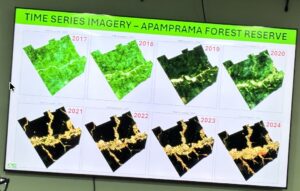
Photo: Colonel Dominic Buah
Recent developments in Ghana’s anti-galamsey operations have once again exposed deep cracks in planning, coordination, and professionalism. The latest incident, where Environmental Protection Agency (EPA) taskforce members working with the military came under heavy fire from illegal miners and were forced to retreat, is not just a tactical failure—it is a worrying reflection of how far operational discipline has drifted from military doctrine.
According to Charles McCarthy, Editor of The Hawk Newspaper, the EPA leadership’s admission that the armed miners overpowered the task force confirms what many analysts have long feared: that the fight against illegal mining has lost its strategic centre. “What we are witnessing is not a failure of courage, but a failure of process,” McCarthy observed.
This latest setback follows closely on the heels of the Hwidiem incident, where NAIMOS personnel on reconnaissance were nearly lynched after moving from observation into unplanned enforcement. “These are not isolated missteps,” McCarthy said. “They show a systemic problem, operations being launched for political optics rather than underpinned by military science, intelligence, and tactical planning.”
Military’s Role Misunderstood
McCarthy notes that the very essence of including the military in the galamsey fight was to guarantee precision, discipline, and intelligence-led execution. “Soldiers are not policemen, and they are not politicians. Their strength lies in method, not muscle,” he argued.
He criticised what he described as “politically choreographed deployments,” where missions begin without proper threat assessments or inter-agency command structures. “The Military Decision-Making Process (MDMP) exists for a reason,” McCarthy explained. “When it’s ignored, chaos replaces coordination, and deterrence gives way to embarrassment.”
A Return to Doctrine-Based Operations
McCarthy urged NAIMOS to rebuild its operational framework on four pillars rooted in military science:
1. Intelligence-Led Missions: Deployments must be grounded in verified intelligence, not political urgency.
2. Tactical and Operational Estimates: Each mission should have clear objectives, risk assessments, and contingency planning.
3. Human Terrain Awareness: Commanders must understand the local context, community ties, grievances, and resistance levels before enforcing the law.
4. Doctrine and Discipline: The hallmark of professionalism is restraint. Reconnaissance must remain reconnaissance; withdrawal should follow the plan, not panic.
Restoring Confidence
McCarthy warned that every poorly executed operation erodes public trust and emboldens illegal miners. “The military’s authority rests on precision and professionalism, not spectacle. Once the public begins to see confusion in uniform, deterrence disappears,” he said.
He called for a visible recommitment to scientific, doctrine-based operations. “NAIMOS must show the country that its soldiers operate with purpose and intelligence, not as a reactive force chasing headlines.”
Conclusion
In McCarthy’s view, Ghana’s war on galamsey will only succeed if it abandons ad hoc political interventions and returns to the rigour of military planning. “The uniform alone does not win battles; it is the discipline behind it that does,” he stated. “When the uniform acts without the map, even courage becomes chaos.”






